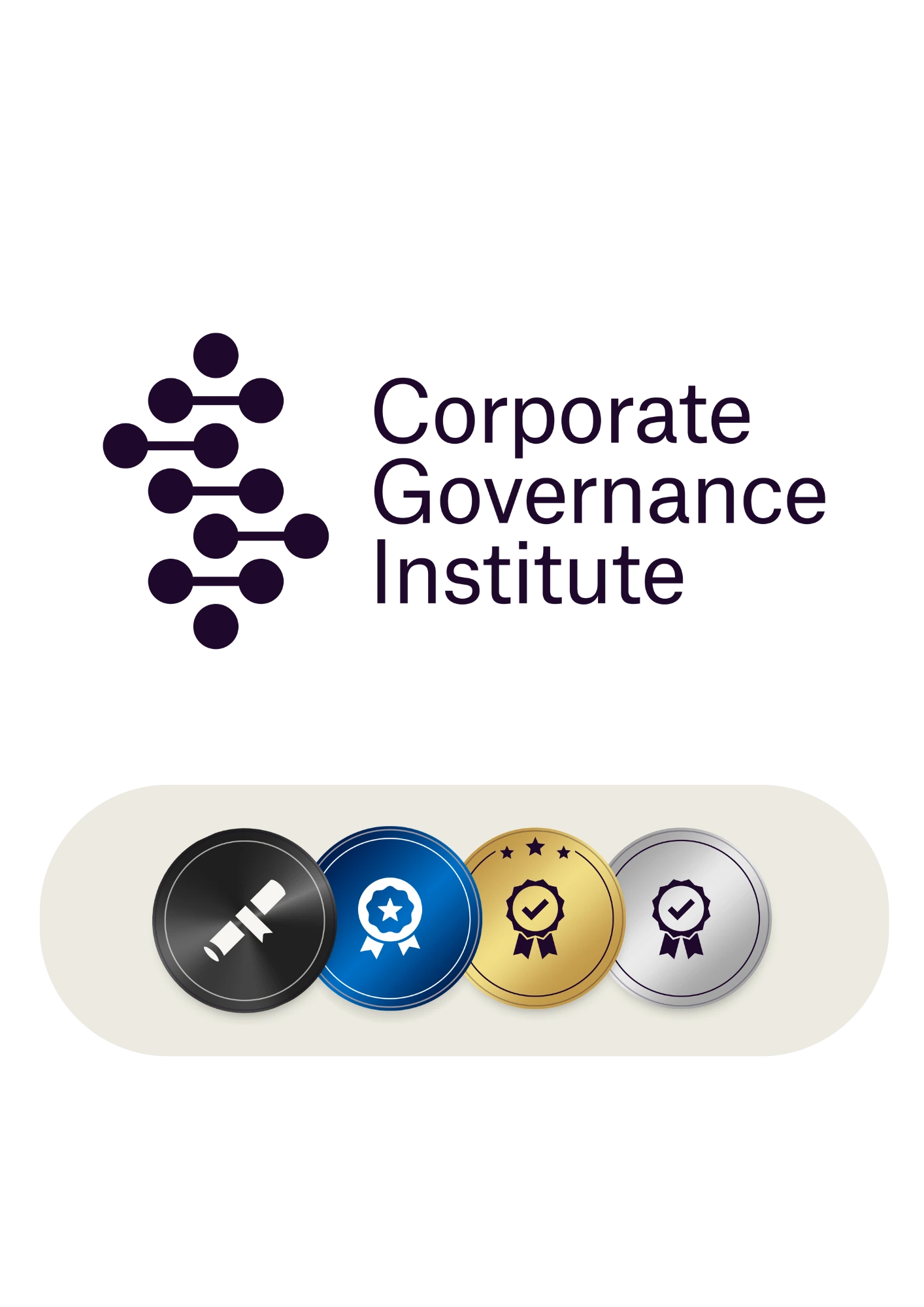Qualification Level
Professional Certificate in Overview of Corporate Governance
X people viewing the course right now
Accelerate your corporate governance insights and capabilities to stay competitive in the boardroom.

Download Brochure
How to quickly upskill with corporate governance training
Accounting, transparency, fairness and responsibility are the four fundamental principles of good corporate governance. Fast-track your governance skills and stay ahead of the competition with a globally recognised, industry-approved qualification from the global standard in corporate governance education.
Short course
Boards across all sectors are seeking members with corporate governance training. Set yourself apart in four modules equivalent to two days of training.
Cost-effective
Don’t let cost implications stall your professional development. Choose to maintain momentum in your leadership career.
Fundamentals
Get an effective board structure and strategy in place using traceable best practices suitable for all jurisdictions across the world.
14-day money-back guarantee
Receive a full refund within 14 days if you choose not to continue. No additional fees or penalties apply to cancellations within this period. T&Cs apply.
Start learning for €1,695
Learn more about the Professional Certificate
Corporate Governance Architecture - The Essentials
Roles and responsibilities: Fully understand different board roles and the expected responsibilities of each director.
Committees: Explore different types of committees, their purpose and what they look like in practice.
Executive team: Learn what needs to be in place to turn heads of function into an effective executive team
Characteristics: Understand the characteristics of each board role and how to identify their impact.
Governance Building Blocks: The Handbook and Reporting
Governance handbook overview: Discover the purpose of the governance handbook and what it needs to include to make governance function effectively daily.
Board policies: Explore the essential policies that make up a good governance handbook.: Explore the many different types of meetings that take place in an organisation.
Board reporting: Elevate your knowledge of why reliable and accurate performance reporting, that includes ESG reporting, is critical for directors. meetings: Be clear about the need for ground rules at board meetings and the role of the chair in meetings.
Technology and AI: Learn how technology and AI tools are being used to enhance the reporting process.
Strategy Essentials
Purpose of strategy: Fully understand the strategy and its importance, the different types of strategy and who should own it.
Strategic tools: Explore an array of tried and tested tools that are used to develop a strategy.
Developing strategy: Explore the importance of analysis, setting goals, supporting actions and developing the plan.
Implementing strategy, division of responsibilities and reporting: Identify the roles and responsibilities of the board and executive for implementing the strategy.
The Board’s Role in Organisational Culture
Cultural characteristics: Discover the Corporate Governance Institute’s seven cultural characteristics framework.
Shaping culture: Explore the factors that influence the culture of an organisation.
Culture in practice: Take an in-depth look at the case for good governance and how culture and values can be embedded into daily life.
Culture and ethics: Examine how important ethics are to an organisation and how they should work in practice.
Module 1: Corporate Governance Architecture - The Essentials
Roles and responsibilities: Fully understand different board roles and the expected responsibilities of each director.
Committees: Explore different types of committees, their purpose and what they look like in practice.
Executive team: Learn what needs to be in place to turn heads of function into an effective executive team
Characteristics: Understand the characteristics of each board role and how to identify their impact.
Module 2: Governance Building Blocks: The Handbook and Reporting
Governance handbook overview: Discover the purpose of the governance handbook and what it needs to include to make governance function effectively daily.
Board policies: Explore the essential policies that make up a good governance handbook.: Explore the many different types of meetings that take place in an organisation.
Board reporting: Elevate your knowledge of why reliable and accurate performance reporting, that includes ESG reporting, is critical for directors. meetings: Be clear about the need for ground rules at board meetings and the role of the chair in meetings.
Technology and AI: Learn how technology and AI tools are being used to enhance the reporting process.
Module 3: Strategy Essentials
Purpose of strategy: Fully understand the strategy and its importance, the different types of strategy and who should own it.
Strategic tools: Explore an array of tried and tested tools that are used to develop a strategy.
Developing strategy: Explore the importance of analysis, setting goals, supporting actions and developing the plan.
Implementing strategy, division of responsibilities and reporting: Identify the roles and responsibilities of the board and executive for implementing the strategy.
Module 4: The Board’s Role in Organisational Culture
Cultural characteristics: Discover the Corporate Governance Institute’s seven cultural characteristics framework.
Shaping culture: Explore the factors that influence the culture of an organisation.
Culture in practice: Take an in-depth look at the case for good governance and how culture and values can be embedded into daily life.
Culture and ethics: Examine how important ethics are to an organisation and how they should work in practice.
Learning Methods
Case Studies
Apply theoretical learning to practical scenarios through case-based challenges that simulate board-level decision-making
Expert Speaker Videos
Learn from global finance & risk experts through structured, high-quality recorded webinars tailored to each module
Discussion Groups
Engage in guided peer discussions to share insights and perspectives on key governance topics
Interactive Q&A Videos
Dive into engaging Q&A sessions embedded in video format, allowing for dynamic learning from real boardroom experience
Knowledge Check
Test your understanding with short quizzes at the end of each module to reinforce key concepts
Course Materials
Access a rich library of toolkits, templates, articles, and reports to deepen your knowledge and support real-world application
Taught by Expert Speakers
You'll learn from leading financial governance experts, including board directors, advisors, and academics with decades of global experience. Their focus is to equip you with the insight, frameworks, and leadership mindset needed to navigate complex governance challenges with confidence.
Earn an industry-recognised board director certification through practical, applied training designed to elevate your impact at board level.

Diarmaid O’Corrbui
CEO of Carmichael
Diarmaid is the CEO of Carmichael, a leading specialist training and support body for nonprofits in Ireland. He is a former executive board director and company secretary and a certified technical corporate governance assessor with the National Standards Authority of Ireland’s Swift 3000 code of practice for corporate governance assessment.

Ruth Odih
Assistant Company Secretary at Centrica Plc
Ruth Odih is a key member of the Secretariat Team at Centrica plc. Her experience is in UK and International corporate governance practices. Her experiences range from large multinationals to large UK-based organisations in catering, energy, oil and gas, private equity and financial services, with some of the organisations being constituents in the FTSE 100 and AIM index. She is a trustee of a local charity and has a Degree and Masters in law.

Mairead Butler
Non Executive Director
Mairéad Butler is a Chartered Accountant and has spent most of her career in financial services in Dublin and Sydney, working in risk, compliance and communications roles. She is a Director of Ireland’s National Maternity Hospital and An Cosán, a charity focused on education as a pathway out of poverty.

Caitríona Somers
Independent Non Executive Director
Caitríona spent ten years as the CEO of the Irish subsidiary of Cunningham Lindsey Group and was a member of the executive global leadership team. A chartered director and fellow of the Chartered Insurance Institute and the Chartered Institute of Loss Adjusters, she holds several independent director positions within the financial services sector.
The Corporate Governance Professional Certificate course covers key concepts, frameworks, and responsibilities essential for effective company governance. It offers a thorough introduction to governance principles, preparing professionals for practical implementation in businesses.
Who is the target audience for the Overview of Corporate Governance Professional Certificate?
For this course, participants have the flexibility to choose from multiple payment options. They can pay for the course in full using the secure checkout facility on our website. Alternatively, for those who prefer a more flexible payment schedule, there is an option to pay in three monthly instalments via Klarna, available directly at checkout. This allows participants to manage their finances more comfortably while gaining access to the course content immediately.
You have four months from the date of enrolment to complete the course. This duration includes finishing all course modules and assessments. This structured timeline ensures that you can progress through the course at a steady pace while managing other commitments.
The course is delivered entirely online and is self-paced, offering participants the flexibility to learn at their own pace and convenience from any location. This format is designed to accommodate the busy schedules of working professionals, allowing them to manage their learning around existing commitments. The course includes a mix of video lectures, interactive exercises, real-life case studies, and downloadable content, providing a comprehensive and engaging learning experience.
The course includes four graded assessments, with one graded assessment corresponding to each module. These assessments are structured to evaluate your understanding and application of the key concepts covered throughout the course. Designed to ensure that you are ready to apply this knowledge in a professional setting, each assessment tests your grasp of the principles discussed in each module, reinforcing the learning objectives and enhancing your mastery of the subject matter.
If you need to retake an assessment or require an extension for completing the course, please contact our learning support team for assistance. You can reach them via email at [email protected]. They will provide you with the necessary guidance and instructions to proceed, ensuring you have the support needed to successfully complete your coursework. The fee for an extension is €150 for an additional 3 months course access.
Yes, support is available throughout the duration of the course. Our dedicated support team is on hand to assist you with any issues or queries you may have, including course material, technical difficulties, navigation issues, or administrative assistance. You can contact them via email at any time for help to ensure you have a supportive and enriching learning experience.
Upon successful completion of the course, you will receive a digital certificate that acknowledges your skills in the respective subject area. This certification serves as a validation of your professional development and expertise, enhancing your credentials for roles in corporate governance, sustainability, or other relevant fields. You can also share this certificate on professional networks like LinkedIn to highlight your achievements and capabilities to your network and potential employers.
Once you have enrolled in the course, you will receive an email containing your login details for the online learning platform. All course materials, including videos, module presentations, readings, and supplementary resources, will be accessible on this platform. You can start engaging with the materials and begin your learning journey immediately after logging in.






















